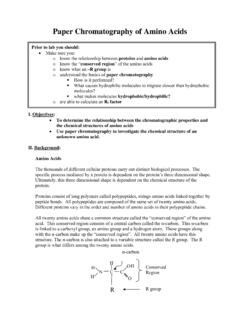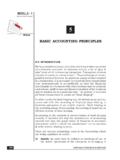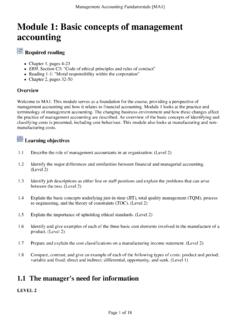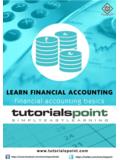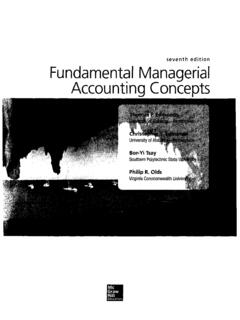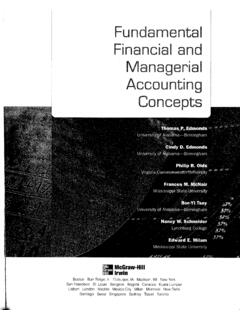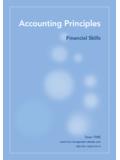Transcription of Business Department - Buffalo State College
1 Business Department Course Information: Fall, 2018 CatNum.: Bus. 313: managerial accounting Instructor: Sol. Ahiarah, PhD., CPA1, CGMA2. Call Nos.: CRN 1295 and CRN 4418; 3 Credits each Office: Tel.: X5339 Time: T & R 10:50 12:05 , for CRN 1295 and T & R 01:40 02:55 , for CRN 4148 This course is offered in a primarily traditional, face-to-face, format. Do not take it if your work schedule or anything interferes or conflicts with the meeting times!!! You cannot do the class activities from a distance! (See also the underscored on and 8 below) Office Hours: M 12:00 - 2:00 ; W 3:00 4:00 Or by appointment Room: Chase 342 E-mail: Prerequisite: Successful completion of Bus.
2 312: Financial accounting . Do not take this course if you have not a priori completely satisfied this requirement, as your chances of succeeding will be affected. Required Material: A Registration Code to access the "CONNECT Learning Management System associated with Fundamental managerial accounting Concepts, 8th Ed., by Edmonds, Tsay, and Olds (ETO) (New York: McGraw-Hill/Irwin), 2017. You must purchase the code for access needed to do required course assignments. You will fail this course if you do not purchase the code to gain timely access and do course assignments in CONNECT within their due dates! (Note: The College Bookstore carries the code, but if you prefer to purchase the registration code elsewhere, click on the Online HW , below, and follow directions).
3 Supplies: Loose-leaf folder and perforated fillers for class notes; HB #2 pencils and standard calculator for examinations (Note: ALL STUDENT S PERSONAL ELECTRONIC DEVICES AND ACCESSORIES ARE TO BE TURNED OFF DURING THE CLASS SESSION. ONLY College COMPUTERS ARE TO BE USED WHEN PROMPTED BY THE INSTRUCTOR. A web/internet accessible device and accessories of any type may not be used, for any reason, during in-class examinations). Online HW Link for Call #1295: and for Call #4148: INTRODUCTION: You are welcome to managerial accounting (offered in the traditional3 format), now that you have successfully completed the pre-requisite,4 , where you, hopefully, built the foundation for this course.
4 Your pursuit of is part of the necessary means of achieving your larger ends that include, qualifying for your desired SUNY- Buffalo State Business degree. Please, understand right away, that we are just as eager to enable you, just as you are eager, to achieve your ends. There must be things or qualities that distinguish the degree holder from those who do not hold the degree. If this were not true, why would you or anybody bother to make the, often difficult, tradeoffs involved? Presumably, the degree would symbolize, among other things, your acquisition of certain 2 knowledge, skills, abilities (KSAs).., such as those listed on , below.
5 You will notice that the include those developed in this, managerial accounting , course a core Business area course here at SUNY- Buffalo State , as well as, at similar worthy academic Business programs in the US. (For additional reasons why accounting is important, particularly to Business (in which you seek to develop expertise), and therefore, also why you have to complete Bus. 313, carefully review pages 8-9, below). Based on the : 1) employers are more likely to pay you a premium above what they would offer no-school- or high-school-educated individuals of your age, race and gender; or, 2) you might, alternatively, be enabled to operate your own establishment and, thereby, either simply make a living or acquire wealth to be used as you please.
6 Or, 3) you qualify for admission to graduate school to pursue an in-depth study of an area beyond the foundations or fundamentals of the area which you might have learned at SUNY- Buffalo State , or, 4) you would become a better rounded, modern person with broadened horizon, that is better informed and equipped to learn and adapt to the vicissitudes of your life. COURSE OBJECTIVES (COs): This , is benchmarked to the SUNY Transfer Paths guidelines for the Introduction to managerial accounting Course (see the guidelines in the sidebar last column of the schedule section below). One of our objectives is to substantially cover those guidelines.
7 As hinted in the introduction section above, this course should primarily help the student to develop certain KSAs which are possible in this setting. In this regard, the course is expected to be a learning focused medium, set-up, or environment in which students are instructed/guided to make a concerted effort to: (#1) complete a general overview of basic, foundational managerial accounting and aspects of cost accounting . This overview includes an introduction to: fundamental managerial accounting concepts, tools, models, techniques or procedures; certain managerial accounting reports, and their analysis and use in facilitating managerial work.
8 The current Undergraduate Catalog conveys the course s scope more succinctly: managerial accounting focuses on accumulating, processing, reporting, and interpreting decision-relevant financial information which are used in managing an organization. Topics include cash flow analysis, time value of money, cost behavior, budgeting, and elements of cost accounting ( see ). Those who successfully complete this course should have applied themselves, followed provided instructions to discover, learn and master said fundamentals , and acquired KSAs from completing the activities listed in the Schedule section ( Activities column) below.
9 Secondarily, the course will also foster the students pursuit/achievement of the following cognate objectives not explicitly addressed in the above-mentioned Activities column: (#2) enhanced ability to communicate effectively in writing, (#3) understanding of the role and importance of accounting information in different types of managerial decision-making, (#4) ability to make a connection between the managerial accounting function and the success of an organization in terms of its financial ends, and (#5) preparedness for subsequent, next-level, studies in managerial accounting . How the stated COs fit into SUNY- Buffalo State s Bachelor of Business Administration Degree Learning Goals (BBA-LGs) and the subsidiary Measurable Learning Objectives (MLOs) SUNY- Buffalo State s BBA-LGs (A Business graduate should possess the following skills): MLOs in a Business Core Course Supporting BBA-LG (A student who completes this course satisfactorily should demonstrably possess most of the KSAs identified above and below): Componental Unit(s) of Specifically Addressing the MLO (see Schedule section below) How Learning Outcome is Expected to be Assessed or Measured #1.
10 A baccalaureate content knowledge of his/her disciplinary concentration. CO#1 Understanding or knowledge of fundamental concepts, tools, models, techniques procedures and certain reports of Concepts: Unit 1B-1 to 1B-3; 1A-1 to 1A-4, 1A-8, 1A-11 to 1A-12; Units 2-6, 3-1; 4-1 to 4-2; 5-1; 6-1 to 6-3; 7-1, 7-2, 7-4 ; --Graded objective-based module comprehensive individual examinations --Graded Indiv. Papers --Partially graded indiv. 3 managerial accounting ; 8-1, 8-2; 9-1 to 9-3; 10-1, 10-2; 11-1; 12-1 and 12-2 participation (observation) --Online graded individual homework --Online chapter review objective-based quizzes --Graded Group Projects: Online CONNECT Online end-of-chapter Tools, Models: Units 2-1, 3-2 to 3-4; 4-3 to 4-5; 5-2 to 5-3; 10-3 to 10-8; 11-2 to 11-7; and 12-5 to 12-9 --Same as in Concepts above Techniques, Procedures Units 2-1 to 2-3; 3-4 to 3-6; 4-3 to 4-5; 5-4 to 5-11; 6-4 to 6-10; 7-3, 7-5; 8-3 to 8-7; 9-3 to 9-8; 10-3 to 10-9; 11-2 to 11-7.



